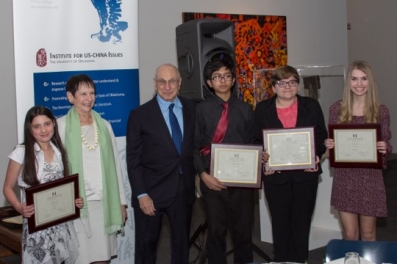Watch this year's Newman Prize for English Jueju ceremony.
Three Oklahoman students among others from the UK, Malaysia, and other states in the USA, have won the 2025 Newman Prize for English Jueju, a poetry contest held in conjunction with the University of Oklahoma’s Newman Prize for Chinese Literature, sponsored by the Institute for US-China Issues in the OU College of International Studies. They were honored on Friday, March 28, at an awards ceremony banquet held in person at the Fred Jones Museum of Art and live streamed on Youtube for international audiences.
The Oklahoma winners include OU student Lucy Coleman who took the top prize in the Oklahoma adult category and Ann Gao with Penelope Cline for the “Best English Jueju Video,” Oklahoma High School winner Vincent Huang of Tulsa’s Oklahoma Chinese Language Institute, and Sherry Wang of Oklahoma School of Science & Technology.
Since 2013, the Newman Prize for English Jueju has been awarded biennially to the best classical Chinese poem written in English following all of the rules of classical poetry. The contest is open to K-12 students, college students and adults from across the globe. The goal of the competition is to introduce students and adults alike to jueju, a traditional form of Chinese poetry that is over 1,500 years old The jueju has four lines of five or seven characters/monosyllabic words, and is widely considered the most beloved and representative form of classical Chinese poetry. Now teachers, students, or others can learn to master the art form through the new learning platform www.juejupath.com, which provides real-time AI backed feedback trained on Jonathan Stalling’s teaching methods and solicits entries through the year for the next award cycle.
The Newman Prize for English Jueju is awarded alongside the Newman Prize for Chinese Literature, which recognizes outstanding achievement in prose or poetry that best captures the human condition. The 20215 Newman Prize for Chinese Literature has been awarded to Taiwanese Poet, Ling Yü, who was honored alongside the English Jueju winners. Past winners of the Newman Prize include Hong Kong writer Xi Xi, Shanghai novelist Wang Anyi, Taiwanese writer Chu T’ien-wen and Chang Kuei-hsing, Taiwanese poet Yang Mu and Mainland Chinese novelists Mo Yan and Han Shaogong. The 2009 laureate Mo Yan has since been awarded the Nobel Prize for Literature.

August 29, 2022
2022 Newman Prize for English Jueju Poetry Winners Announced
Winners:
Sofia Saronne, UK winner, Saint Paul’s Girls School, London
Tobin Bosse, Oklahoma Middle school winner, Norman (home school)
Dylan Chaoomchaisiri, Oklahoma high school winner, Mustang High School
Jacob Dayon, Oklahoma adult winner, University of Oklahoma
Honorable Mention:
Wiley Zeigler, Oklahoma middle school category, Whittier Middle School, Norman
Jenni Luong, Oklahoma high school category, Norman North High School
Alison Ramsey, Okahoma adult category, University of Oklahoma
Jian Ling Shen, teachers' category, St. Albans School, UK
UK winner Sofia Saronne with a “ze-start" new style jueju:
Rebirth
Cold mist, fresh buds, small chicks sing
Thin haze, sweet scent, wind chimes ring
Clear stream, lush grass, young child shifts
New birth, bright dawn, once more spring.
Cold (2) mist (4) / fresh (1short) buds (1 long)/ small (2) chicks (4) sing (1 long)
Thin (1 short) haze (1 long)/ sweet (2) scent (4), wind (1short) chimes (1 long) ring (long)
Clear (1 short) stream (1 long)/ lush (2) grass (4), young (1 short) child (1 long) shifts (4)
New (2) birth (4) / bright (1 short) dawn (1 long) / once (2) more (4) spring (1 long).Sofia’s poem follows the ancient “ze-start” vowel pattern:
We can see that the first line’s word units are parallel in meaning with the second line as pairs like “cold mist” and “thin haze” or “fresh buds” and “sweet scents” or “small chicks sign” with “wind chimes ring” all have an unmistakable sympathetic resonance. The Meanings may be perfectly parallel, but their vowels are perfectly antithetical, where there is a unit ending in a “ze” sound above, it will have a unit ending in a “ping” sound both below it and coming after it.
In this way Sofia’s poem reveals the possibility to bring language itself into harmony by balancing the yin and yang of both meaning and sound. Meanwhile the poem’s message develops from nature to human emotion and the message of new beginnings.
Oklahoma Middle school winner Tobin Bosse with a “ze-start" new style Jueju:
Sóft mìst / wārm āir smáll broòk flōws
Līght fōg / swíft gùst quīck streām gōes
Rōugh haīl / báre dìrt cōld hārd nìght
Frésh hòpe / brāve dāwn yóung gràss grōws
Sóft mìst / wārm āir/ smáll broòk flōws
Līght fōg /swíft gust/ quīck streām gōes
Rōugh haīl / báre dirt/ cōld hārd nìght
Frésh hòpe / brāve dāwn/ yóung gràss grōws
First Light
Soft mist warm air small brook flows
Light fog swift breeze quick stream goes
Rough hail bare ground cold hard night
Fresh hope brave dawn young grass grows
The poem begins with the two-word unit “Soft mist” which is parallel in meaning with the two-word unit beneath it “Light fog,” yet their vowels are opposite with the first two-word unit ending in a “ze” sound and the one beneath it a “ping” vowel sound. And yet as we look to the third line, which see “rough hail” which holds an opposite meaning (antithetical meaning) to the word units above it, but their sounds are perfectly parallel with the word group above it (as it also ends in a “ping” sound). As we read the rest of Tobin’s poem we can see that every other word unit are equally well balanced with each word following the prescribed pattern of meanings and vowel sound which result in a poem that not only announces the end of hard times and heralds rebirth, but has done so by bringing language itself into harmony and balance with nature.
Oklahoma high school winner Dylan Chaoomchaisiri (student of Karen Bullen) with an amazing old-style jueju:
Scarce Clouds Vast sky Warm swift wind
Calm stream Bright bloom Oak birch blend
Faint voice Still Dock One last cast
Sun Fall Moon rise Sweet days end
Dylan’s poem captures an eternal moment familiar to many in Oklahoma, the last cast of a fishing line at dusk before calling it a night. The old-style jueju rules require a poet to write the first two lines introducing and deepening the description of a natural scene (oak birch blend), while the third line introduces a human element, and the fourth line reveal how the external scene resonates with ones internal feeling. And for master poets, like Dylan, we also receive an insight. In this case that sweet days, like all things exist in cycles.
Oklahoma adult category winner Jacob Dayon (OU) with a “ping-start" new style jueju:
The Last Day of Summer
Clear sky fresh grass cool breeze slows
Bright dusk earth trail calm creek flows
Blurred thoughts dead end torn heart sinks
Vast air new trek still bird crows
Clēar skȳ / frésh gràss / cōol brēeze slōws
Bríght dùsk / ēarth trāil cálm creèk flōws
Blúrred thòughts/ dēad ēnd tórn hèart sìnks
Vāst aīr / néw trèk/ stīll bīrd crōws
Jacob’s poem follows a “ping start pattern”
Clear sky is a “ping” word unit followed by a “ze” unit “fresh grass” and a three “ping” unit “cool breeze slows” while the next line is a perfect opposite: with “blurred thoughts” ending in a “ze” vowel, “earth trail” ending in a “ping vowel” and “calm creek flows” gives us a “ping, ze, ping” which follows the prescribed vowel pattern. Yet Jacob has also created a wonderful sense of parallelism in the meaning of these lines where “clear sky” is parallel with “bright dusk” and yet also creates an antithetical resonance with the third line’s “blurred thoughts.” The same can be said for the remaining word units in the first three lines. Finally his overall poem follows the underlying requirements of any jueju to offer a poem that reveals the interconnected nature of human feeling and the natural world ending in a single re-imagined natural image: “still bird crows.”
Oklahoma middle school honorable mention Wiley Zeigler (Whittier Middle School) with an old-style jueju:
Birds chirp sun comes day is here
Cats yawn stars go six grows near
We rise sun shines wind blows leaves
Free heart soft breeze sky so clear
Like all great old-style Jueju, the poet places his or her upmost care on revealing the deeper connections between the external world of nature and the internal world of human feeling and perception. Wiley’s charming jueju does this by building careful parallel and antithetical meanings within the first three lines of the poem, while establishing a sense of cyclical time, while the fourth line provides a key insight into the human condition: how and what we see is conditioned by how and what we are feeling. With a “free heart,” it is not just that the breeze is soft, and the sky, so clear, but the mind of the one who beholds them as such.
Oklahoma high school honorable mention Jenni Luong (Norman North High School) with an old-style jueju:
Mournful Night
Cool jade soft silk wood flute blows
Warm tea high moon light breeze flows
Old vows lost youth one mourns love
Lone girl sad night harsh time slows
Jenni’s poem, like Dylan’s chose to follow the rules of the Old-style jueju and focused her efforts on establishing the external scene which springs from the pages of Classical Chinese poetry with a strong emotion, again ending in a resonance and insight, one that reveals the subjective experience of loss.
Oklahoma adult honorable Alison Ramsey (OU) with a “ping-start" new-style jueju:
Anxiety
Sun (1 short) down (1 long) Mild (2) Gust (4) Oak (1 short) trees (1 long) sway (1 long)
Lake (2)drifts(4) / Clear (1short) Sky (1long) Moon (2)glints(4) grey (1long)
Tense (2) thoughts (4)/ Bright (1short) Star (1long) Dim (2) light(4) Cast (4)
Tired (1short) eyes (1long) Brief (2) rest (4) Bares (1short) new(1long) day (1long)
Sun down Mild Gust Oak trees sway
Lake drifts Clear Sky Moon glints grey
Tense mind Bright Star Dim light Cast
Tired eyes Brief rest Bares new day
While Alison’s jueju doesn’t follow parallel meanings between lines, her poem follows the “ping-start new-style” vowel pattern with “Sun down,” a two-word unit that ends in a “ping” sound, and it is followed in the line by “mild gust,” a two-word unit that ends in a “ze” sound, while the corresponding word unit in line two below, “Lake drifts,” ends in a “ze” sound. Each word unit follows this rigorous pattern.
Honorable Mention for School Teachers winner Jian Ling Shen of St. Albans School, UK for her “ping-start" new-style jueju:
Cold air warm light hawks soar high
Wet path dry hay calf bleat why
Old life new phase time let slip
Long days short months heart drums sigh
Like other “ping-start” new-style jueju Jian Ling matches the ping and ze sounds horizontally “cold air” (ping) followed by “warm light” with its “ze” end sound, and vertically with the “ze” pair “wet path.” From these first word pairs to the final “ping” phrase “heart drums sigh,” Jian Ling’s poem delivers.

Tobin Bosse, elementary winner, home school (Norman)
Carleigh Wilcox, Curtis Inge Middle School (Noble)
Ari Johnson, high school winner
Shane McClendon, adult winner, English teacher at Millwood High School (OKC)
Elementary school winner Tobin Bosse's poem not only follows the horizontal patterns and vertical parallelism of meaning but also follows the rules that require a poem to alternate between long and short vowel sounds in proscribed patterns handed down from 1,500 years ago. The poem, in short, is a masterpiece of English jueju!
The Oasis
Hot sand dry gust quick rough wheeze
Pale earth warm air swift crisp breeze
Pure light deep joy worn soft heart
Lost pool still grass stout green trees
Middle school winner Carleigh Wilcox's poem is in the five-syllable genre of jueju. It is a truly beautiful poem filled with such startlingly imagistic details, from the ‘light tin” of the shark’s skin to the “short points” of its “thin teeth,” the poem’s immersive details are a delight to read.
Deep Sea Shark
Gray shark light tin shine
Thin teeth short point fine
Blue pool sea life thrive
Dark seas deep salt brine
High school winner Ari Johnson composed a moving verse that invokes a winter landscape juxtaposed with images of a warm human world of a loving relationship. Traditionally, the key feature of a jueju is this merger of the external world of nature and the human world of emotion and Ari’s poem exemplifies this.
Winter sights
White snow tall trees sun shines bright
Warm coat cold nose breeze is light
Young girls hold hands sing so soft
Still world lone wolf birds take flight
If you read our adult winner Shane McClendon's poem horizontally, you will find a beautiful poem that brings us into the Red Earth of the Oklahoma landscape and ends that suggests a meditation on the land run. But if you read the poem vertically, you will find the words are composed in columns following the rules of parallelism: “Red” is parallel with “dry” and antithetical with “coo.” The same is true of the next column: “Dirt” is parallel with “dust” and antithetical to “rain” and so on down the line. This pattern represents the ancient Chinese poetic form that balances the “yin and yang” of the work’s meanings to restore balance and harmony to the world in every poem. These complex rules make this poetic genre one of the most complicated forms in world literature.
Red Dirt
Red Dirt Tall Grass Clear Wild Plains
Dry Dust Old Leaves Bare Raw Grains
Cool Rain Low Clouds Full Hearts Watch
Land Loved Ground Lost Where Man Claims
Colby Baumann, Tuttle Intermediate School
Jennifer Sosa, Carver Middle School (Tulsa)
Elizabeth Blazek, Norman High School
Lindsay Jones, University of Oklahoma (Norman)
Elementary school winner Colby Baumann wrote a poem full of sound; in his imagistic lines, readers can both see and hear the wind and the waves, and the imagination is stoked by suggestive words:
Blue sea bright sun green grass grows
Sharp rocks small clouds calm breeze blows
New boats old rocks waves crash down
Sun sets moon rise the sea flows
Middle school winner Jennifer Sosa’s poem evokes a very Oklahoman scene, where the weather can shift dramatically from "blue" to "grey" in the space of a minute, and a storm rolls in to create a “tense” sky. But there is a twist at the end, a sort of phenomenological question about whether what one sees is "real" or not:
Clear air warm breeze white clouds gleam
Blue sky birds sing low lone stream
Grey clouds tense air storm I see
Calm now slight wind it’s a dream.
High school winner Elizabeth Blazek composed a vivid piece depicting a quiet but eventful evening, in which one can feel the breeze and see the night stars through her delicate choice of words. Her poem conveys a feeling of contented excitement:
Vast sky sparse clouds stars shine bright
Clear air soft breeze moon glows white
Swift streak hands held wish is cast
Brief smile warm touch heart grows light
The winner of the college/adult category, Lindsay Jones, worked parallelism into her poem while at the same time evoking the changes that occur in the shift from winter to spring through rich images:
Dead leaves stark sky cold winds blow
Brown grass gray clouds chill air flows
New roots rich land warm earth holds
Deep down sprouts reach start to grow

Morgan Brooks, Midwest City Elementary School
Ahsan Mashruf, Carver Middle School (Tulsa)
Lauren Morris, Deer Creek High School (Edmond)
Nicole Emery, University of Oklahoma (Norman)
Elementary school winner Morgan Brooks struck a deep chord with her evocative poems that bring the reader right into the moment that precedes an oncoming storm. We seem to be right there with her as the storm rolls in and we feel that rush of excitement and awe.
Black comes night falls dark blue sky
Grey clouds slight lit see go by
Girls jump moist face strong wind blows
Soft breeze lake shines storm waves high
Middle school winner Ahsan Mashruf took everyone by surprise with a sophisticated poem marled by a clear use of parallelism and imagery as well as a thematic progression from the natural to the human world:
Bright day clear skies warm light shines
Warm noon calm winds hot sun blinds
Cold night fierce shows breath like ice
Red fire warms hands rest your mind
High school winner Lauren Morris composed a moving verse that instills a powerful image of a wild fire with a delicate choice of words setting in motion the subtle yet frightening power of a Oklahoma grass fire.
sun glares wind blows air stirs leaves
clouds shift sky shines bird cuts breeze
smoke forms grass burns homes left bare
land gone ash stays fires won't cease
The majority of this year’s winners not only followed basic rules of composition (meter, rhyme, and thematic constraint), but also followed rules of parallelism, requiring them to compose their poems both vertically and horizontally at the same time. Nicole Emery, winner of the college/adult category accomplished this with tremendous skill.
Dark night dim stars fresh fog drifts
Gray dusk pale moon crisp haze shifts
Clear day flushed skin worn thoughts still
Night quits morn’ breaks slow hand lifts

Donovan Helterbrand
Aaliyah Elders
Casey Cai
Spencer McCoy

The 2011 Young Writer's Award was awarded to the Oklahoma high school student(s) whose 2,000-3,000 word mini-dictionary/ encyclopedia best captured the character of their high school. Dictionary entries could explore the people, places, slang or rituals that define their school.
Winner: Eleanor Sun, Edmond North High School
Runner-up: Nathan Hill, Union High School
Finalists:
Ananya Rudra, Norman North High School
Arthur Dixon, Ardmore High School
Jenna Adams, Rebecca Birdwell, and Leslie Nungester, Pawnee High School
Julie Frances Grice, Plainview High School
Lauren Hall, Norman North High School.
Jurist Caitlin Campbell: “Sun capably reminds us of the fun, spirit, and pride many of us experienced in high school, but at the same time she teaches us the unique characteristics of Edmond North. Sun conveys a tone and form clearly reminiscent of Han Shaogong’s A Dictionary of Maqiao while maintaining her own voice and making the style her own. This is quite simply a job well done.”
Jurist Kathy Hoang: “Every student realizes by the time of their graduation that their school has become more than just a place of learning. It has been, for the past four years, the nesting ground for memories, friendships, and experiences that have in some way or another transformed the student. To capture the character and spirit of the school is no easy task, but Eleanor Sun managed to do it with grace.”

Winner: Fitore Kusari, Moore High School (Exchange student from Kosovo)
Fitore Kusari received the 2009 Newman Young Writer's Award for her essay "Taking Flight" about 2009 Newman Prize for Chinese Literature winner Mo Yan’s short story “Soaring.”